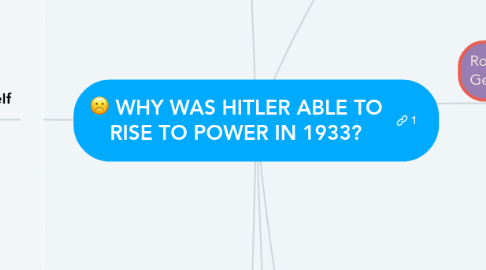
1. Long Term Factors
1.1. Treaty of Versailles
1.1.1. Lost land
1.1.2. Lost dosh
1.1.3. Lost power
2. The Role of Hitler himself
2.1. Quote about the nature of nazism: ‘[Nazism was] a movement that was deliberately designed to highlight by every manipulative device – symbols, language, ritual, hierarchy, parades, rallies … the supremacy of the dynamic, irrational factors in politics: struggle, will, force, the sinking of individual identity in the collective emotions of the group, sacrifice, discipline.’
2.2. “The cruelties of the civil war and ‘red terror’ in Lenin’s Russia were making an impact, and Hitler could use them to (justify his) far-right views"
2.3. “In bringing Hitler to power, chances and conservative miscalculation played a larger role that any actions of the Nazi leader himself” – Ian Kershaw 1991
2.4. “By replacing class with race, and the dictatorship of the proletariat with the dictatorship of the leader, Nazism reversed the usual terms of socialist ideology” - Andrew Roberts
2.5. Good credentials, e.g. Iron Cross
2.6. Strong oratory skills
2.7. anti-semitism
2.8. Charismatic personality and social influence
2.8.1. "... the living incarnation of the nation's yearning... "- Georg Schott
2.8.2. “He seemed, as many who listened to his early speeches testified, to speak straight from the heart, and to express their own deepest fears and desires” - Andrew Roberts
2.8.3. “He exuded self confidence, aggression, belief in the ultimate triumph of his party, even a sense of destiny” - Andrew Roberts
2.8.4. “Without necessarily using overtly religious language, Hitler appealed to religious archetypes of suffering, humiliation, redemption and resurrection lodged deep within his listeners’ psyche….he found a ready response” - Andrew Roberts
2.8.5. “Hitler’s speeches reduced Germany’s complex social, political and economic problems to a simple common denominator: the evil machinations of the Jews” - Andrew Roberts
3. Short Term Factors
3.1. Reichstag Fire
3.2. Elections of March 1933: Nazis get 43% of votes
3.3. Backstairs intrigue: Hindenburg and Von Papen think they can control Hitler, even if they do many him chancellor.
3.4. Recruited by Hindenburg
3.5. In November 1932 elections the Nazis again failed to get a majority of seats in the Reichstag. Their share of the vote fell – from 230 seats to only 196. Hitler contemplated suicide. But then he was rescued by Hindenburg.
3.5.1. Franz von Papen (a friend of Hindenburg) was Chancellor, but he could not get enough support in the Reichstag. Hindenburg and von Papen were having to govern by emergency decree under Article 48 of the Constitution. They offered Hitler the post of vice-Chancellor if he promised to support them.
3.5.2. Hitler refused – he demanded to be made Chancellor. So Von Papen and Hindenburg took a risk. On 30 January 1933 Hindenburg made Hitler Chancellor. He thought he could control Hitler – how wrong he was.
3.5.2.1. In the end, Hitler did not TAKE power at all – he was given it.
4. Economic Factors
4.1. The severe hit to Germany's economy gave Hitler a foothold to assert that Weimar was a weak and flawed system, and that a Jewish conspiracy was weakening the German people
4.2. Germany was especially hit hard by the economic crash as they depended heavily on the U.S. economy
4.3. "The economic crisis that struck Germany in 1929 also damaged Weimar's foreign relations" - Micheal Lynch
4.4. Hitler shifted political fcous after 1930, towards workers and industrial population, who are described as "disillusioned with democracy under the impact of high unemployment"
4.5. Unemployment rose to record levels. By 1933, 6,000,000 Germans were out of work.
5. Role of Psychology and the German People
5.1. Humiliation felt from losing the war
5.2. Humiliation felt from the TOV
5.3. Stephen J. Lee suggests that there was an "anti-democratic feeling which severely damaged the fabric of the republic."
5.4. Function of political thinkers; Wilhelm Hegel, Friedrich Neitzsche and Heinrich von Treitscke
5.4.1. German political figures who all glorified the function of war as well as emphasis on the power of individuality, whom should contribute in building a supreme state.
5.4.1.1. Hegel: war is "is the great purifier" & emphasized the importance of "the supreme r3ight of the state over the individual"
5.4.1.2. Neitzsche: urged mankind to be "lords of the earth", and not to fall "slavish to Christianity"
5.4.1.3. Treitscke "war is the basis of all political virtues"

